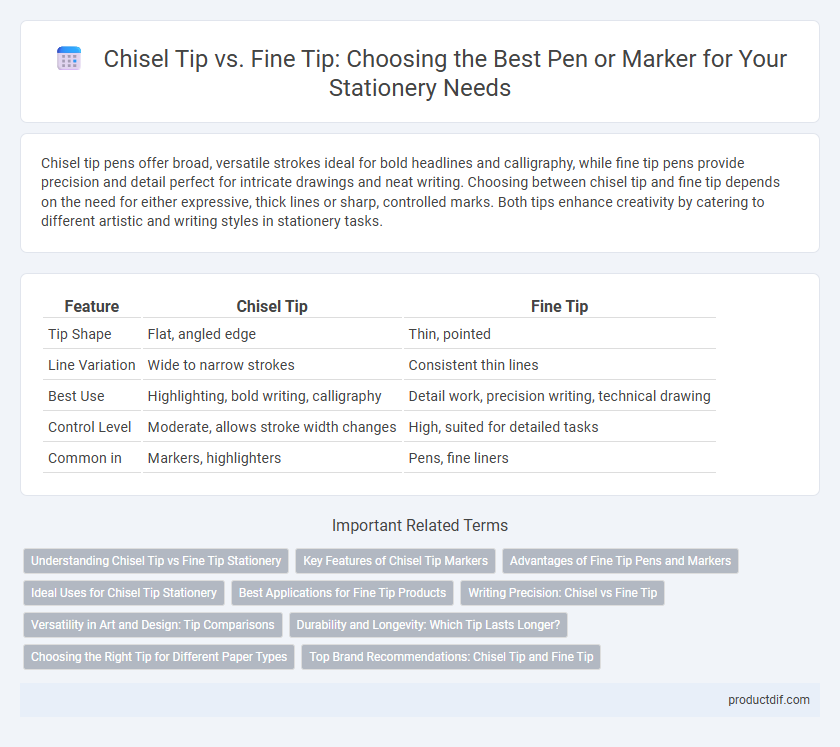Chisel tip pens offer broad, versatile strokes ideal for bold headlines and calligraphy, while fine tip pens provide precision and detail perfect for intricate drawings and neat writing. Choosing between chisel tip and fine tip depends on the need for either expressive, thick lines or sharp, controlled marks. Both tips enhance creativity by catering to different artistic and writing styles in stationery tasks.
Table of Comparison
| Feature | Chisel Tip | Fine Tip |
|---|---|---|
| Tip Shape | Flat, angled edge | Thin, pointed |
| Line Variation | Wide to narrow strokes | Consistent thin lines |
| Best Use | Highlighting, bold writing, calligraphy | Detail work, precision writing, technical drawing |
| Control Level | Moderate, allows stroke width changes | High, suited for detailed tasks |
| Common in | Markers, highlighters | Pens, fine liners |
Understanding Chisel Tip vs Fine Tip Stationery
Chisel tip stationery offers versatile line widths ideal for highlighting and calligraphy, while fine tip stationery provides precision for detailed writing and intricate designs. Understanding the functional differences helps in selecting the right tool for specific tasks, whether emphasizing text or creating sharp, clear lines. Choosing between chisel tip and fine tip depends on the desired effect and application in art, note-taking, or professional documentation.
Key Features of Chisel Tip Markers
Chisel tip markers offer versatile line widths, enabling both broad strokes and fine details, making them ideal for highlighting, calligraphy, and detailed artwork. Their flat, slanted edges provide precise control and smooth ink flow, ensuring consistent coverage without streaking. These markers are favored for bold, dynamic designs due to their durability and ability to produce varying stroke thicknesses with a single tool.
Advantages of Fine Tip Pens and Markers
Fine tip pens and markers offer superior precision, allowing for detailed and intricate work ideal for technical drawings, note-taking, and handwriting. Their controlled ink flow reduces smudging, making them perfect for clean, professional-looking documents. Additionally, fine tips provide versatility across various paper types, enhancing clarity and legibility in everyday stationery use.
Ideal Uses for Chisel Tip Stationery
Chisel tip stationery is ideal for creating bold, broad strokes and precise angled lines, making it perfect for highlighting, calligraphy, and artistic lettering. Its versatile edge allows users to switch between thick and thin lines effortlessly, enhancing visual emphasis in presentations or creative projects. This tip type excels in applications requiring clear, attention-grabbing marks on various surfaces like paper, whiteboards, and posters.
Best Applications for Fine Tip Products
Fine tip stationery products excel in applications demanding precision and detail, such as technical drawing, intricate note-taking, and delicate handwriting. Their narrow point allows for clear, sharp lines ideal for annotations, detailed sketches, and professional documents. Users seeking accuracy in small spaces prefer fine tip pens and markers for reliable control and refined results.
Writing Precision: Chisel vs Fine Tip
Chisel tip pens offer versatile line widths ideal for bold strokes and shading, enhancing calligraphy and highlighting tasks with broad precision. Fine tip pens deliver consistent, thin lines perfect for detailed writing, precise illustrations, and intricate note-taking, ensuring sharpness and clarity. Choosing between chisel and fine tips depends on the required writing precision, with fine tips excelling in detail and chisel tips providing dynamic, varied lines.
Versatility in Art and Design: Tip Comparisons
Chisel tip markers offer versatility in art and design by enabling broad strokes and fine lines, making them ideal for calligraphy, shading, and filling large areas with color. Fine tip markers provide precision and control for intricate details, line work, and detailed illustrations, essential for technical drawings and delicate designs. Choosing between chisel and fine tips depends on the balance of broad coverage and detailed accuracy required for a specific creative project.
Durability and Longevity: Which Tip Lasts Longer?
Chisel tip markers typically offer greater durability and longevity due to their robust, angled design that withstands heavy use and maintains shape better over time. Fine tip markers, while precise, often wear down faster because their narrow tips are more prone to fraying and damage from frequent pressure. For users prioritizing long-lasting performance, chisel tips generally provide extended usability compared to fine tips in stationery tools.
Choosing the Right Tip for Different Paper Types
Chisel tip pens provide broad, bold strokes ideal for textured or rough paper, ensuring ink coverage remains consistent without feathering. Fine tip pens deliver precise, detailed lines perfect for smooth, glossy paper, minimizing smudging and allowing for intricate designs or writing. Selecting the appropriate tip enhances ink performance and durability, tailored to specific paper surfaces like cardstock, notebook, or photo paper.
Top Brand Recommendations: Chisel Tip and Fine Tip
Top brand recommendations for chisel tip markers include Sharpie and Staedtler, known for their bold, versatile strokes ideal for highlighting and calligraphy. For fine tip pens, brands like Pilot Precise V5 RT and Sakura Pigma Micron deliver precise lines perfect for detailed writing and intricate artwork. Both chisel and fine tips cater to distinct creative needs, with top brands offering reliability and quality for professional and personal use.
Chisel Tip vs Fine Tip Infographic

 productdif.com
productdif.com